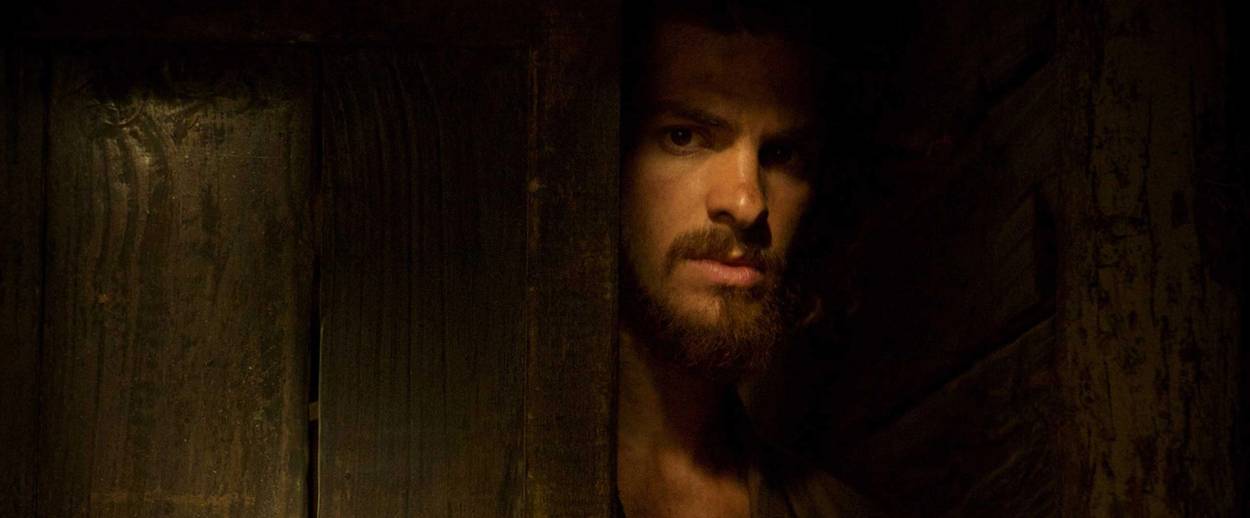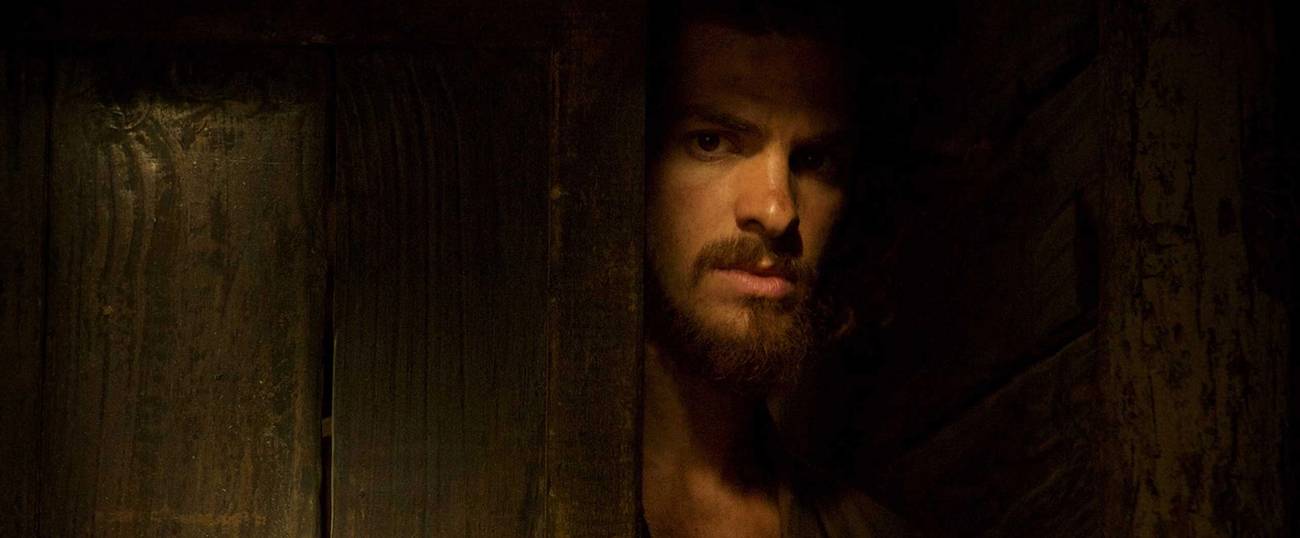Scorsese’s ‘Silence’ Is One of the Greatest Jewish Films Ever Made
Sure, it’s about Portuguese Jesuits in Japan, but the movie’s theological message is one we should all embrace




Martin Scorsese’s Silence, which tells the story of two 17th-century Portuguese Jesuits who travel to Japan to find their missing mentor and spread their imperiled faith in a land that bans it, may very well be among the greatest Jewish movies ever made.
Ignored, foolishly, by the Academy in this year’s Oscars race, and celebrated, rightly, by Catholic commentators for being a pure and profound meditation on faith, the film is not only a masterwork but also one we Jews would do well to take seriously. That’s because the idea at the core of the film is the thick theological trunk both Jews and Catholics share, and with which both have wrestled for millennia: the problem of doubt.
What use have two missionaries for uncertainty? As the film begins, very little. Rodrigues, played by Andrew Garfield, and Garupe, inhabited by Adam Driver—both young actors deliver such searing performances that make you worry a little that they may collapse before they make it to the end of this long movie—start out by insisting that their order dispatch them to Nagasaki. There, they hope to find and retrieve their mentor, Father Ferreira, who is rumored to have given into the Shogunate’s inquisition, renounced his faith, and married a Japanese woman. Garupe and Rodrigues refuse to believe that the man who instructed them in the teachings of Christ is capable of apostasy. They’re not so much adamant as uncomprehending: When Garupe says the account of his teacher’s downfall is simply not possible, you are looking at a man who seems ontologically incapable of entertaining the thought.
Before too long, however, the pair arrives in Japan, and their certainty is watered down by a landscape described—by Rodrigo Prieto’s stunning cinematography as well as by several of the characters themselves—as a watery marsh unable to sustain surety of any sort. The authorities, fearful that Christianity is merely the vanguard for the West’s colonizing appetites, ban the religion and hunt down its followers, with none more prized than the foreign padres who preach it. Before too long, Garupe and Rodrigues are both captured, and are offered mercy at a small cost: If they step on an image of the Christ, they and their followers will be spared.
For nearly three hours, the two wrestle with apostasy and its physical and metaphysical consequences. To pressure the padres even further, the authorities torture their innocent Japanese flock in horrendous ways, including dipping men and women in pools of boiling water or tying them to a cross in the ocean and waiting for the ebb and flow of the tide to drown them slowly, over many days. The padres pray to Jesus, but he, as you might’ve guessed from the film’s title, remains silent.
Shusaku Endo, the Catholic Japanese writer on whose novel of the same name the movie is based, meditated on that silence and found it deafening. “Behind the depressing silence of this sea, the silence of God,” he wrote, “the feeling that while men raise their voice in anguish, God remains with folded arms, silent.”
What is there to say when the Almighty says nothing as his creations suffer and die? It is, of course, a question Christian and Jewish theologians—from Augustine to Martin Buber—have grappled with mightily. Buber’s offering remains one of the most intriguing. Meditating on the question of theodicy—the attempt to explain the existence of evil in light of God’s absolute goodness—both before and after the Holocaust, Buber argued that God was very much like the sun: always present, forever burning bright, but frequently eclipsed from human view. When night falls, we’ve no choice but to wait for another dawn, and, meanwhile, rethink our relationship with the Creator.
Most of Buber’s argument revolved around a meditation on the Book of Job, the densest tale in a volume thick with them. Job, Buber argued, found himself at an impasse with the Lord, and emerged instead with something far more sustainable than metaphysics: the gift of an all-too-human religion.
“Instead of the ‘cruel’ and living God, to whom he clings,” Buber wrote of Job, “religion offers him a reasonable and rational God, a deity whom he, Job, does not perceive either in his own existence or in the world, and who obviously is not to be found anywhere save only in the very domain of religion.” Unlike God, who is ultimately unknowable, religion is something a man’s mind may grasp. And religion, of course, cannot be followed privately. It requires community. Job, Buber writes, isn’t one man; “Behind this [Job’s] ‘I,’ there stands the ‘I’ of Israel.”
It takes Father Rodrigues a while to come around to a similar point of view. Arrogant and cerebral, he questions the purity of his followers’ faith. Do they yearn for the small, makeshift crosses he gives them because they cling to objects rather than to dogma? And is their willingness to die for their belief merely the result of a simplistic interpretation of Christ’s teaching? Nowhere is Rodrigues’ approach more evident than in his relationship with Kichijiro (the sublime Yosuke Kubozuka), a cowardly local guide who betrays Rodrigues several times, yet returns each time to ask for the padre’s forgiveness. “Do you even understand what absolution means?” the imperious Rodrigues roars, but everything about their relationship suggests that Kichijiro understands it far better than the Jesuit. He knows that absolution isn’t an escalator to the heavens but a conversation starter between two humans here on Earth. Kichijiro is afraid, lonely, weak. He fails often, and when he does what he seeks is not so much the grace of an unknowable God but the warmth of a present fellow man. Only after Rodrigues witnesses and suffers enough violence does he finally understand this notion. When he does, he apostatizes, just as his Japanese inquisitors—and American spectators seated at the multiplex—knew he would.
Had he abandoned his faith? Had God abandoned him? In the hands of a lesser film director with a more limited religious imagination, the answer would’ve been yes. But Scorsese knows better. He’s learned from that other great modern Catholic artist, G.K. Chesterton, a thing or two about the mechanics of uncertainty. “The materialist,” Chesterton wrote in his book Orthodoxy, “is sure that history has been simply and solely a chain of causation, just as the [lunatic] is quite sure that he is simply and solely a chicken. Materialists and madmen never have doubts.” True believers, however, do, and it’s doubt that helps them break through. “I did try to found a little heresy of my own,” Chesterton writes in the same book, “and when I had put the last touches to it, I discovered that it was orthodoxy.”
What Rodrigues ends up with, then—I’ll leave Garupe’s fate a mystery for the benefit of anyone who may yet see the movie—isn’t heresy but orthodoxy reconfirmed along Buber’s lines, a religion based on quiet contemplation and the cultivation of community. He reconnects with his old teacher, Ferreira, who had indeed taken a Japanese wife and chose to surrender to the regime rather than die a martyr. Together, the two spend the rest of their lives working together in silence for the inquisitor, sifting through the cargo of incoming ships in search of Christian contraband. But they have not abandoned their religion, merely reconstructed it in a different way.
How? Again, Job is a useful guide. As his sits and suffers, the book tells us, his friends Eliphaz, Bildad, and Zophar approach and see the magnitude of his sorrows. They walk up to their aggrieved pal, and instead of offering any theological explanation, they merely sit beside him in silence. “They sat with him seven days and seven nights,” the book goes on, “and no one spoke a word to him, for they saw that his suffering was very great.” Eliphaz, Bildad, and Zophar, like Ferreira and Rodrigues, know that sometimes, when faced with immense and incomprehensible suffering, the only thing to do is look not upward but sideways, to your friends and loved ones who are right there, suffering beside you. Even Jesus agrees: As the movie nears its end, Christ speaks to Rodrigues, assuring him that he’s never been silent but that he was there all along, right beside his faithful emissary, suffering with him.
Of course, Jews and Catholics still approach destiny differently. “To the Christian,” Buber mused, “the Jew is the incomprehensibly obdurate man who declines to see what has happened; and to the Jew, the Christian is the incomprehensibly daring man who affirms in an unredeemed world that its redemption has been accomplished. This is a gulf which no human power can bridge.” But in Scorsese’s Silence, both faiths converge and, for a brief, ethereal moment, affirm that godliness is always present, even when it’s unseen, and that a true person of faith always believes, even—or especially—as he or she is grappling with doubt. Uncertainty, after all, is “in every true discernment that is open to finding confirmation in spiritual consolation.”
The man who spoke this last line is the Holy Father himself, Pope Francis. Discussing Silence with Scorsese at the Vatican, the pontiff said the film “bears much fruit.” It sure does: In the last moments of the movie, as a now-aged Rodrigues passes away and is burned in a traditional Buddhist funeral, the camera enters his cylinder-like coffin and zooms in on his hand. There, clasped tight, is a small wooden crucifix. Through doubt and violence, persecution and anguish, external threats and internal tumults, religion remained unshaken, faith stayed strong, and God never more present as he’d been in his silence.
***
Like this article? Sign up for our Daily Digest to get Tablet Magazine’s new content in your inbox each morning.
Liel Leibovitz is editor-at-large for Tablet Magazine and a host of its weekly culture podcast Unorthodox and daily Talmud podcast Take One. He is the editor of Zionism: The Tablet Guide.